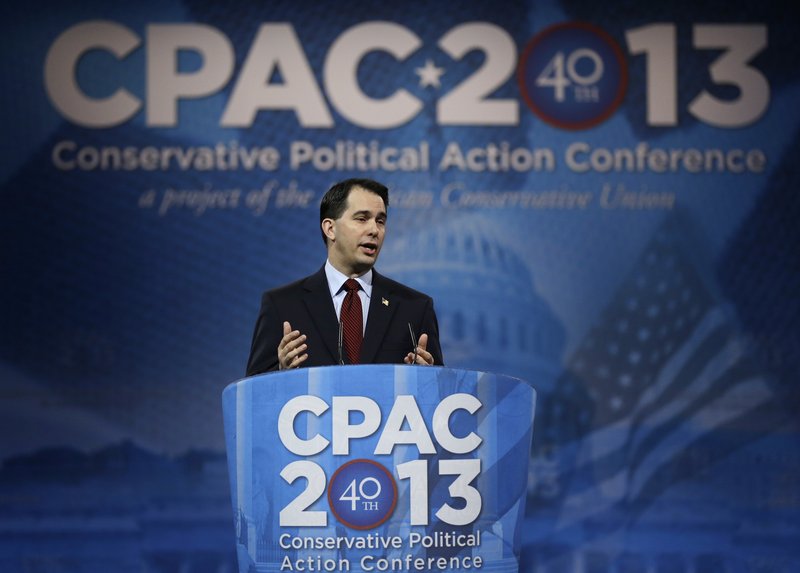MADISON, Wis. – Another year, another campaign.
Wisconsin Gov. Scott Walker is gearing up for re-election next year, his third race in four years. But the Republican’s courting of out-of-state donors and conservatives, his plans to visit Iowa this week and his refusal to say whether he would serve out another full term if elected suggest he might be seeking a much bigger prize — the presidency.
Not that he will openly acknowledge as much.
“I love being governor,” Walker said recently, just two years after bursting onto the national political scene when he challenged public unions and a year after surviving a recall election. “I’ve had to work hard for it. I’m focused on being governor, and I’m going to continue to be governor as long as the people of the state want me to be governor.”
Such remarks are common these days as the 45-year-old seeks to simmer down the buzz about his political future even as his travel schedule suggests he has clear national aspirations, perhaps as early as 2016.
Walker spent part of this week at fundraisers in Connecticut for the state Republican Party and in New York City for the New York State Republican Committee.
On Thursday he planned to travel to Iowa, traditionally home of the nation’s first presidential caucus, to address Republican activists at the Polk County GOP fundraiser in West Des Moines.
Walker’s advisers insist he is focused on his 2014 re-election campaign. But they acknowledge they have talked privately about a possible future presidential bid. Still, they say they are not building a campaign, taking formal steps to run, or even developing a plan for how Walker would do so.
They play down the Iowa appearance by contending that Walker simply was returning a favor to Republican Gov. Terry Branstad, who invited Walker to Thursday’s event and held a fundraiser for him in Dubuque, Iowa, during the 2012 recall election.
Yet Walker has taken a number of steps to put him in a position to undertake a presidential bid if he were to win a second term.
He’s appealed to national conservatives, who make up the core of GOP presidential primary voters, with series of high-profile speeches to the National Rifle Association’s annual meeting and the annual Conservative Political Action Conference.
In June, he will speak the Faith and Freedom Coalition, an event organized by Ralph Reed, and headline a Republican Jewish Coalition fundraiser in California.
A prodigious fundraiser, Walker has focused on keeping active, if not building upon, a national donor network that was critical in helping him beat back the recall attempt.
Aside from the Northeast fundraisers this week, he’s also continuing to engage his top donors, who helped him raise nearly $35 million in 2011 and 2012, about two-thirds of which came from outside Wisconsin. They include Diane Hendricks, the owner of ABC Supply Co., in Beloit, Wis.; Richard and Elizabeth Uihlein, owners of Illinois-based U-Line Corp.; Las Vegas casino mogul Sheldon Adelson; and Wyoming billionaire Foster Freiss.
His conservative record as governor and advice to fellow Republicans suggest a possible approach to a candidacy.
In an era in which Washington remains toxic to voters, Walker presents himself as a reform-minded outsider who pushed an effort to strip public employee unions of most of their collective bargaining rights. It’s a fight, he says, that’s now paying dividends for the state.
The state’s budget outlook has a $500 million surplus, and Walker has said he favors using some of that money to deepen his income tax cut and give schools more money.
The quasi-private economic development agency Walker created to help spearhead job-creation efforts has been plagued with scandals and other problems. An audit found that the agency routinely did not follow state law in handing out grants and tax credits.
Should he run for president, Walker would face a field of challengers that could include Sens. Marco Rubio of Florida and Rand Paul of Kentucky, New Jersey Gov. Chris Christie and Wisconsin Rep. Paul Ryan, the 2012 vice presidential nominee who is the governor’s friend.
“What he can or could bring to the table is a record on successful reforms and successful leadership of a Midwestern state that has always been considered tough — it’s gone back and forth for Republicans and Democrats,” said Betsy DeVos, a former RNC committeewoman.
Send questions/comments to the editors.



Success. Please wait for the page to reload. If the page does not reload within 5 seconds, please refresh the page.
Enter your email and password to access comments.
Hi, to comment on stories you must . This profile is in addition to your subscription and website login.
Already have a commenting profile? .
Invalid username/password.
Please check your email to confirm and complete your registration.
Only subscribers are eligible to post comments. Please subscribe or login first for digital access. Here’s why.
Use the form below to reset your password. When you've submitted your account email, we will send an email with a reset code.